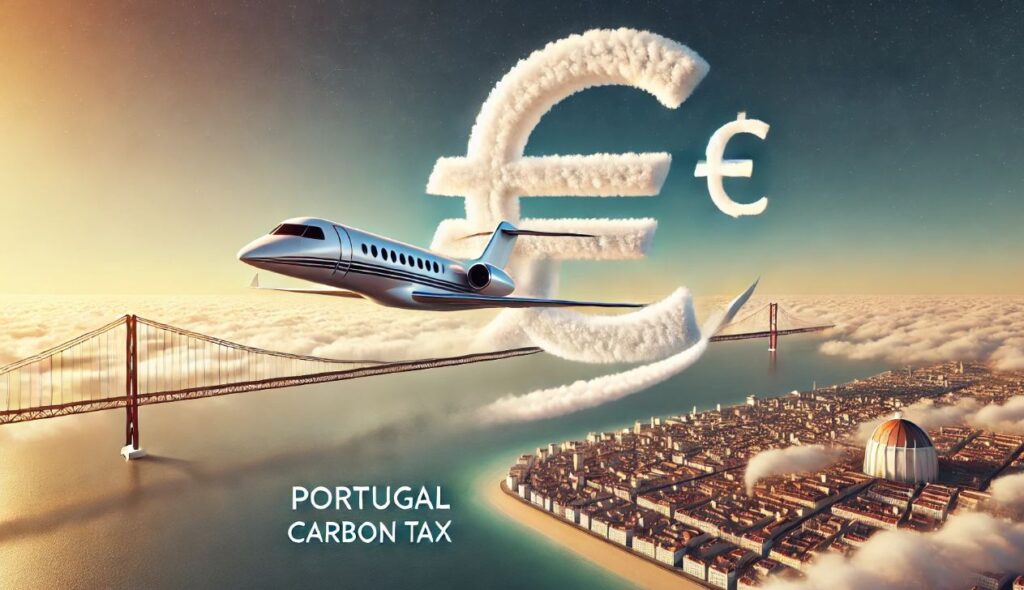Portugal’s Carbon Tax: What Business Aviation Operators Need to Know

Portugal’s National Civil Aviation Authority (ANAC) introduced a Carbon Tax in July 2023, expanding its scope to include non-commercial business aviation. While similar in concept to earlier environmental levies on airline passengers, this tax presents unique compliance challenges for business aircraft operators.
Here’s everything you need to know.
Understanding the New Tax
This new levy, which took effect on July 1, 2023, has evoked discussion and confusion within the industry. Unlike emissions-based taxes common in other regions, this tax is a new fiscal obligation to address different regulatory objectives.
The tax applies to all flights departing from Portugal, including tech stops in the Azores islands, with exemptions for certain situations like emergency diversions, electric aircraft, state-owned aircraft, and specific service-oriented flights.
How the Tax is Calculated
The Portugal Carbon Tax applies to all departures from Portuguese airports, including technical stops in territories like the Azores. Designed as a fiscal environmental measure, the tax is intended to address aviation-related emissions rather than being directly tied to fuel burn or CO₂ output, as seen in other carbon pricing systems.
For aircraft with up to 19 seats, the tax is calculated using a specific formula:
Carbon Tax=TC×CP×S×(D+1)\text{Carbon Tax} = TC \times CP \times S \times (D + 1)
Where:
- TC = Tax rate (currently €2)
- CP = Pollution coefficient (10)
- S = Maximum seating capacity of the aircraft
- D = Distance in kilometers divided by 1,000, rounded to the first decimal place
This means the total tax owed will increase with both the aircraft’s seat capacity and the flight distance.
Compliance Challenges for Business Aviation
One of the primary concerns for operators is the administrative burden of compliance. Unlike airline operators who may already have systems in place for similar taxation schemes, many business aviation operators lack the infrastructure to handle these requirements seamlessly.
Key challenges include:
- Registration and Payment Processing – Operators without a fiscal presence in Portugal must appoint a fiscal representative to manage tax obligations.
- Power of Attorney Requirements – Engaging a local representative often requires legal documentation, which can be cumbersome to set up, especially for larger organizations.
- Ground Handling Fees – Some operators have attempted to pay the tax through ground handlers, but this often comes with additional subscription fees for fiscal representation.
Exemptions and Special Considerations
While the tax applies broadly, certain types of flights are exempt, including:
- Fully electric aircraft
- State and government flights
- Training flights
- Medical evacuations and search-and-rescue missions
- Repositioning flights where the aircraft is not piloted by the owner
Additionally, flights departing from Portugal but landing within Portugal (such as intra-country repositioning) are not subject to the tax. However, operators should be aware that a stop in Portuguese territories, such as the Azores or Madeira, does not exempt a flight from taxation.
How Universal Can Assist
Universal simplifies Portugal’s Carbon Tax compliance with end-to-end tax management, expert representation, and seamless payment processing. Our team handles calculations, filings, and reporting while ensuring compliance across multiple EU travel tax schemes. Reduce administrative burdens and avoid penalties—contact us today to streamline your tax obligations.
Conclusion
As Portugal’s Carbon Tax continues to impact business aviation, staying informed and prepared is essential. Understanding the requirements, exemptions, and administrative processes will help operators avoid delays and compliance issues. As regulations evolve, keeping up with changes will be key to ensuring smooth operations in Portugal and beyond.




